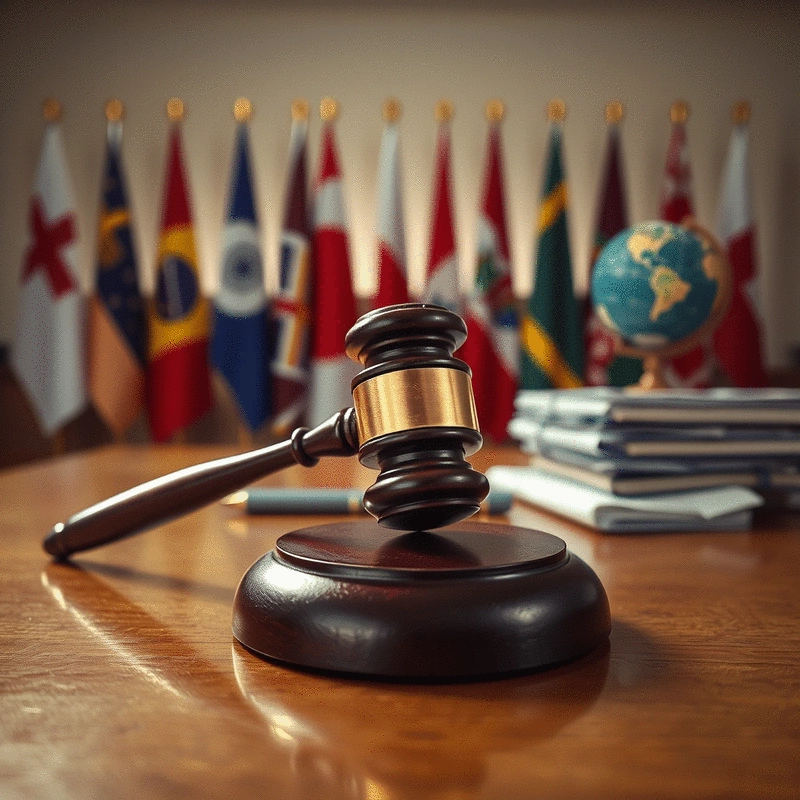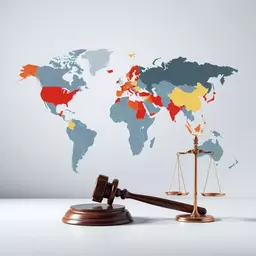Extradition Disputes and Outcomes

What if the fate of a person accused of a crime hinged on complex international laws? Understanding the intricacies of extradition disputes can illuminate the global landscape of justice and accountability.
Key Takeaways
- Extradition is a formal process requiring both countries to classify the act as a crime, emphasizing the principle of dual criminality.
- The political offense exception allows countries to refuse extradition requests based on political motivations, complicating many cases.
- Post-extradition treatment varies based on international agreements, affecting prisoner rehabilitation, rights, and family contact.
- Successful extradition outcomes often depend on strong legal representation and understanding the political context surrounding the case.
- International cooperation is vital for resolving disputes and ensuring fair treatment throughout the extradition process.
- Public perception and media coverage can significantly influence extradition proceedings, making strategic communication essential.
Key Factors in Extradition Disputes
Understanding the intricacies of extradition involves several key principles that influence legal decisions. Below are crucial elements that affect extradition outcomes:
Dual Criminality
For extradition to occur, an act must be a crime in both requesting and requested countries.
Political Offense Exceptions
Countries may refuse extradition requests if the charges are deemed political in nature.
Prison Conditions
Different countries have varying standards for incarceration, influencing extradited persons' well-being.
Rehabilitation Programs
Some nations provide programs aimed at helping individuals reintegrate and reduce recidivism.
Understanding Extradition Disputes and Their Global Implications
Extradition is a critical component of international law, facilitating the return of individuals accused of crimes to the country where the offense occurred. It helps ensure that justice is served across borders, but the journey through extradition is often fraught with legal disputes. An extradition dispute arises when there are disagreements about whether a person should be extradited, often involving complex legal frameworks that dictate how these cases are handled. Understanding these frameworks is essential for anyone navigating the treacherous waters of international law. For more detailed insights into handling such situations, consider exploring resources on criminal defense lawyers in Dubai.
At Extradition Interpol UAE, we recognize the importance of clear, accessible information regarding extradition processes. Legal frameworks governing extradition can differ significantly between countries, often influenced by bilateral treaties and regional agreements. This variability can lead to disputes that not only complicate individual cases but also have broader implications for international relations.
An Overview of Extradition in International Law
To grasp the intricacies of extradition, it’s essential to understand some key definitions. Extradition is the formal process by which one country asks another to surrender a suspected or convicted criminal. Legal terms like "extradition treaty" and "Red Notice" come into play here. A Red Notice is issued by Interpol to alert member countries about a person wanted for prosecution or to serve a sentence. This notice plays a pivotal role in the extradition landscape, acting as a call to action for international cooperation. You can learn more about responding to an Interpol Red Notice to better prepare for such scenarios.
It’s fascinating to note that extradition disputes can arise from multiple sources, including political disagreements, differing legal standards, or humanitarian concerns. The complexities involved often require not just legal expertise but also diplomatic finesse to resolve, highlighting the intertwined nature of law and politics on the global stage.
Key Legal Principles Guiding Extradition Cases
The Principle of Dual Criminality
One of the bedrock principles of extradition law is dual criminality. This principle stipulates that for extradition to occur, the act in question must be considered a crime in both the requesting and the requested countries. This requirement ensures that individuals are not extradited for actions that are legal in the country where they are located, adding a layer of protection for personal rights.
For instance, if someone is accused of a crime that is classified differently in another jurisdiction, it can lead to heated disputes. Countries often have varying definitions of crimes, and understanding these nuances is vital for legal professionals navigating these cases. Being aware of these differences can significantly impact the strategies employed during extradition proceedings.
Political Offense Exceptions
Another crucial aspect of extradition is the political offense exception. This exception allows countries to refuse extradition requests if the charges are deemed political in nature. Such cases often involve individuals who have been accused of politically motivated crimes, leading to complex legal arguments about what constitutes a political offense. For more information on navigating these complex legal waters, consider exploring defense strategies for extradition cases.
- Examples of political offenses may include actions taken during protests or dissent against a government.
- Countries may leverage this exception to protect their citizens from unjust persecution.
- Understanding the nuances of this exception is crucial for legal defense strategies.
The implications of these exceptions can be far-reaching, affecting not just the individuals involved but also shaping international relations. As we delve deeper into specific case studies, these principles will serve as a foundation for understanding the outcomes of notable extradition disputes.
Quick Summary
Here's a brief recap of the key points discussed so far:
- Extradition is a vital process in international law that faces various disputes, influenced by legal frameworks and political factors.
- Key principles such as dual criminality and political offense exceptions play significant roles in shaping extradition cases.
- Post-extradition outcomes, including rehabilitation and transfer agreements, are critical for understanding the treatment of individuals after extradition.
Post-Extradition Outcomes and Legal Implications
After the often intense and challenging process of extradition, it’s essential to consider what happens next. The journey doesn't end with a transfer from one country to another. Instead, various legal implications and processes unfold, particularly concerning prisoner treatment and rehabilitation. Understanding these aspects can offer valuable insights for individuals facing extradition, as well as for legal professionals involved in such cases.
One crucial area is the concept of rehabilitation. This involves programs designed to reintegrate individuals into society, addressing the root causes of their criminal behavior. Additionally, transfer agreements between countries can significantly impact how extradited individuals are treated post-transfer, influencing their rights and access to resources.
Understanding the Aftermath: Rehabilitation and Transfer Agreements
When an individual is extradited, several factors determine their treatment and rehabilitation process. This includes the legal agreements in place between the countries involved. Here are some key points to consider:
- Prison Conditions: Countries may have different standards for incarceration, impacting the well-being of the extradited person.
- Rehabilitation Programs: Some nations offer programs aimed at helping individuals reintegrate and reduce recidivism.
- Legal Rights: Extradited individuals often retain certain legal rights, including the right to appeal their sentences.
- Family Contact: Maintaining connections with family can play a crucial role in rehabilitation outcomes.
These factors highlight the importance of international cooperation in ensuring that individuals are treated fairly after extradition. Additionally, they emphasize the need for legal counsel to navigate the complexities of post-extradition scenarios effectively.
Lessons Learned from Famous Extradition Disputes
Examining notable extradition cases provides valuable insights that shape current practices in international law. Here are some critical lessons:
- The Importance of Legal Representation: Successful outcomes often hinge on strong legal advocacy, emphasizing the need for professional guidance.
- Understanding Political Contexts: Political sensitivities can significantly influence extradition cases, as seen in various high-profile disputes.
- International Cooperation: Collaborative efforts between countries can lead to more effective resolutions and better treatment of individuals involved.
- Public Perception: Media coverage and public opinion can impact legal proceedings and outcomes, highlighting the need for strategic communication.
At Extradition Interpol UAE, we understand that knowledge is power. By examining these lessons, individuals facing extradition can better prepare themselves and advocate for their rights. It also equips legal professionals with the insights needed to navigate this complex landscape effectively. For more details on the legal landscape, explore understanding UAE extradition laws.
Engaging with Extradition Issues: FAQs and Common Queries
Frequently Asked Questions About Extradition
As complexities arise in the realm of extradition law, many individuals have questions. Addressing these common queries can demystify the process:
- What are the requirements for extradition? Each country has specific legal criteria that must be met, such as the nature of the offense and the existence of an extradition treaty.
- How do countries negotiate extradition treaties? Negotiations involve diplomatic discussions, often influenced by political relationships and mutual legal interests.
- Can an extradited individual appeal their case? Yes, many jurisdictions allow for legal appeals, which can delay or potentially overturn extradition decisions.
- What happens if the extradition request is denied? Denial can result from various factors, including insufficient evidence or political motivations behind the request.
These questions reflect the common concerns of individuals facing extradition. By seeking answers, individuals can better understand their rights and options throughout the process.
FAQs on Extradition Disputes
- What is dual criminality in extradition?
Dual criminality is a core principle stating that for extradition to occur, the alleged act must be considered a crime in both the requesting country and the requested country. This prevents extradition for actions legal in one jurisdiction but illegal in another.
- What is the political offense exception in extradition?
The political offense exception allows a country to refuse an extradition request if the charges against the individual are deemed to be political in nature. This often applies to individuals accused of acts of protest or dissent against a government, rather than common crimes.
- How do prison conditions affect extradition outcomes?
Prison conditions can significantly impact extradition decisions. If the requested country believes that the individual's human rights might be violated or that they would face inhumane treatment in the requesting country's prisons, the extradition request may be refused.
- What role do Red Notices play in extradition?
A Red Notice is an alert issued by Interpol at the request of a member country, seeking the location and arrest of a person wanted for prosecution or to serve a sentence. While not an international arrest warrant, it acts as a strong international request for cooperation in apprehending individuals for extradition purposes.
- Can an extradited individual appeal their case or sentence?
Yes, in many jurisdictions, extradited individuals retain the right to appeal their case or sentence. The specific appeal processes and grounds for appeal depend on the laws of the country to which they were extradited and the terms of any extradition treaties involved.
Encouraging Reader Engagement and Discussion
Now that we've explored various facets of extradition, I invite you to share your thoughts! What are your views on notable extradition cases? How do you think global extradition practices could improve? Join the conversation on social media platforms or within the comments section of our blog!
Engaging in these discussions not only fosters community but also helps us all learn from each other's experiences and insights. Remember, at Extradition Interpol UAE, we're here to empower you with knowledge and support as you navigate these complex legal waters. For further reading, consider extradition treaties and legal rights.
Recap of Key Points
Here is a quick recap of the important points discussed in the article:
- Extradition Overview: Extradition is a formal process that involves the return of individuals accused of crimes to the country where the offense occurred, often complicated by legal disputes.
- Dual Criminality Principle: For extradition to occur, the act in question must be a crime in both the requesting and requested countries, ensuring protection of personal rights.
- Political Offense Exception: Countries can refuse extradition requests if the charges are deemed political, requiring a nuanced understanding for legal strategies.
- Post-Extradition Treatment: Factors such as prison conditions, rehabilitation programs, and legal rights significantly affect the treatment of extradited individuals.
- Lessons from Case Studies: Notable extradition disputes underscore the importance of legal representation, understanding political contexts, and fostering international cooperation.
- Common Queries: Key questions include requirements for extradition, negotiation processes, rights to appeal, and implications of denied requests.



